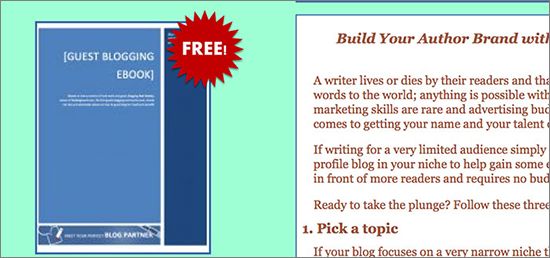Helpful Tips For Social Media Promotion of Your Ebook
a guest post by Anna Fox

Once the words are out and the proofing is done, you’ll find yourself with an ebook that’s ready to be published and, if all goes according to plan, adored by the public at large, making you a healthy amount of money and establishing you as a writer whose work is well worth reading.
The trick to achieving that goal lies in your ability to moonlight as a marketer. When it comes to self-publishing, you lose the assets that traditional publishing firms have to offer, and there is probably no asset that you’ll miss as much as having a well-trained advertiser on your side.
Luckily, though, the web at large and social media in particular make being an effective marketer easier than you may think, allowing you to be a full-time writer and a part-time advertiser, and all to wonderful results.
If you’ve got an ebook to self-publish and you want it to be the success that you’ve always dreamed of, follow these seven helpful tips for social media promotion of your ebook:
1. Prepare Your Accounts

No social media promotion can take place without well-connected accounts, of course, so the first step in getting the word about your new ebook out to the world at large requires that you start making friends with people online who share a common interest with the themes and ideas that your book touches on.
Whether you’re using Facebook, Twitter, or any other of the seemingly endless different social networks, such as the very helpful social sharing hub MyBlogGuest, you’ll need to make as many connections as possible in order to build an audience worth hawking your wares to.
2. Orchestrate a Build Up
Exactly how far and wide you’re able to spread the word about your book in advance of its release will determine just how successful your sales at launch are, so you’ll need to come up with an intriguing marketing plan in the months leading up to the big release date. This can involve any number of tactics, so long as they’re always aimed towards helping more people to be aware of your book, what it has to offer, and exactly why they should be looking forward to reading it.
To this end, consider releasing tantalizing details about settings, plot lines, and characters, the wittiest and most humorous of quotes from the book, and any associated media such as artwork, photography, and other visual aids. All of this will combine to have your fans genuinely excited for what’s to come, even while building what will surely prove to be a loyal following as you build your writing career.
3. Celebrate Your Launch in (Virtual) Style
Parties may have required a physical address in years past, but social media has made it possible to come together with hundreds or even thousands of like-minded people virtually, and this represents a fantastic way to get your book off of the ground, build excitement among your buyers, and help both word of mouth and internet buzz to draw in many more people who may be interested in spending a few dollars in order to read what you’ve written.
As most writers come to realize, the excitement of having published a book fades away quickly if no one has read it.
Thankfully, social media platforms like Instagram can serve as a fantastic opportunity for writers to spread the word about their books and gain more popularity. Instagram is a highly visual medium that rewards original content. Success on this platform comes from a carefully planned content strategy. Here are some strategies for you to create original visual content for your readers.
- Prior to launch, you could share multiple variants of your book cover art and request your followers to vote on their favourite.
- Post screenshots of your favourite quotes and snapshots from your book.
- Announce author events so followers can attend and share photos and videos from the venue.
- Share photos of yourself with your favourite books.
- Content barter—connect with other writers and cross-promote each other’s books to followers.
- Share photos from your initial draft, places you went for inspiration and so on.
Each genre is unique, and what works for one genre or story might not work for another. A good idea is to work out a marketing strategy on Instagram well before you are ready to start.
Millions of users tap the “Search” option on Instagram every day. Your posts can start appearing higher in the search results, especially when someone’s searching for keywords related to books.
The Instagram algorithm considers data points while ranking posts on search. Among these points are use of relevant hashtags, engagement levels on posts, location tags and so on. Oberto provides a guide to better understand search. These ideas should likely to get real likes on instagram and comments but also promote your book in a non-salesy way.
4. Unique Hashtags and Keywords Build Buzz

While connecting with like-minded readers, each of them a potential buyer, on popular social networking websites is a fantastic start, the real audience is out there, among the millions of people who may very well love your book, but also run the risk of never hearing about it at all.
Hashtags and keywords to the rescue! Whether you’re writing about your book in thousands of words on a blog or in 140 characters on Twitter, be sure to use hashtags and keywords that reflect the many nuances of your book. For example, if you’re publishing a financial how-to guide, you’d mention keywords such as “making money” and “increasing wealth.” If you’ve written a fantasy novel a la Harry Potter, you’d go the route of utilizing hashtags like “#magic” and “#fantasy.”
This type of effort is exactly what you need to draw new people into your circle, helping them to find you via searches and social trends and growing your ebook-related network with potential readers who have a real, genuine interest in your topic. Those are, after all, the people most likely to invest in the cost of your work.
5. Connect with Each and Every Fan
Your fans pay the bills; therefore, your fans deserve your attention. Even once your ebook has been released and sales start happening, be sure to continue to give your readers all of the social attention that they ask for, helping them to feel at home with both you and your book.
Besides earning the appreciation of readers and giving them a good reason to tell a friend about how well-written and approachable you are, you’ll also begin building the kind of following that promises to follow you from publication to publication, helping you to achieve success in the future as you push further into your career as a writer.
6. Contests, Competitions, and Giveaways – Oh My!
Generating buzz around a new ebook, whether it be a technical manual aimed at web designers or a fanciful piece of fiction, can be exceptionally difficult, but offering up freebies is always a great way to grab the attention of potential buyers and new fans.
Leading up to the launch of your ebook, use your social media status to host interactive contests that result in your followers getting a free copy of your work. Try to create the contests in such a way that they relate directly to your topic, helping you to generate buzz not only around what you promise to give away, but also around your topic itself.
Remember: a single copy of your ebook costs absolutely nothing to give away, so don’t be stingy when it comes to allowing no-cost copies of your work to make their way to the masses. Besides intriguing potential new buyers with the interest that your promotional tactics will inspire, you’ll also be setting up more and more people with the ability to spread the word about how much they enjoyed and how much they took from your book, and that may very well turn out to be the most important advertising of all.
7. Be an Expert in Your Niche
With so much competition out there, you can be sure that there is very little new under the sun, and that requires that you make very sure that you know exactly what you’re talking about, letting your readers know that your words are worth consuming, even amongst the many millions of words available to them at any given time.Instead of trying to find readers on other websites, Search Combat SEO finds what your target reader is looking for on the internet and then makes your website or landing page the best result for Google or Bing to show in their results for that search. Some of this work happens on your website. Much of it happens on other websites that will link back to you to help with the keyword terms you are trying to rank for. SEO starts with looking for the keywords that your website already ranks for and then helps them rank better through creating new articles and Backlink Building using those keywords as anchor text pointing back to your website. The next step is looking for other keyword opportunities and doing more of what worked for your search results. SEO is a constant program of test, analyze, and repeat.
If you’re writing a technical manual, be sure to always know what you’re talking about, not only within your work, but when associating with fans and followers, as well. If you’ve written a historical piece, know your history. If you’re pushing a fantasy novel, know the niche well enough to appeal to those readers who are sure to be well-versed in the niche.
Images Credits: keywords, blogging.
About the author: Anna Fox is the writer addicted to self-improvement. She is running a blog where you can find dozens of tips for increasing productivity. For spreading the word about her ideas she is using Viral Content Buzz – free social media platform for content promotion.

8 Responses
@Sabra — I agree with both Robert and Mike, who know their stuff. I’m guessing Anna (the author of this post) would weigh in similarly, but I can’t speak for her. Non-fiction is like opening a store… unless we’re opening a J.C. Penny’s, it’s best to keep our shoe stores and our hamburger stores separate.
Okay, bad analogy, but I hope you see the point. Wishing you the best of luck with your writing endeavors! Larry
I definitely feel that it is important to talk about the subject of your book, and yes, about the very existence of your book, in online forums that are regularly visited by people who might share a common interest. (Just ask yourself, “well, where might -I- hang out, if I were interested in this subject and/or in this particular type of book?”)
Don’t just show up there once to “spam” a message … stay there and talk, start to build up a reputation, and, say, put a URL link in your regular signature. You’re not doing that with the purpose of “fooling Mother Google.” No, you’re doing it for the convenience of the people who have “begun to get to know you.” People like to buy things from a friend. They also like things that make efficient use of their time.
When someone happens to stop-by your site and its appointed page, which you should of course link-to directly, package your wares accessibly and informatively. Let the potential reader read a few pages, see a sales-blurb or what have you … and -politely- point them in the direction of making a purchase. Don’t push; don’t hype. Once they’re “in the room,” your purpose is no longer to attract them to the room. It’s to guide them to the realization that, yes, they really do want to buy this thing.
@Sabra–If you’re asking if you need separate accounts just to promote your book, as opposed to what I see at a glance on your blog, then the answer would be “yes.” You can certainly promote your book on your Homepreneur site. But it would stand to reason you’d delve more into the aspects of how you worked it as a business model, for example.
The general rule of thumb for writers is to keep their genres separate. Meaning, if you normally write mysteries and decide to write a horror novel, you would need a different site, or at least, a separate page on your site just for that particular audience. The same thing applies to the people who want to read about writing. If they have to sift through posts about being an entrepreneur from home and running a business to find the topics that deal with your writing, some people will just walk away. Because not every reader is a business person. So you have to differentiate the two, entertain and promote your book on one hand, while holding homepreneurs in the other. That would apply to the specifics of your Facebook accounts, as well as any other accounts where the one topic may bog down the other, or divide your audience.
Storyfix.com, for example, deals with writing. And Larry provides services under that banner here. If someone were to ask a business question that didn’t come specifically under that heading, he might answer it here if it benefitted his subscribers for this site on the whole. If not, he would probably send an email. And if he had a separate site set up on becoming a homepreneur, he might politely direct that person over to that site, or provide links at the top of his Storyfix site to his other services that interested parties could click on if interested.
I hope this helps 🙂
Thanks for this post! I am in the process of writing my first ebook, and have been wondering when and how I should start promoting it! You gave me some simple, solid advice.
I do have one question. Should I make separate social media accounts for my book? I wouldn’t think so for Twitter, but what about Facebook? Just curious.
Anna, thanks for including MyBlogGuest! It’s great to hear it’s a useful tool for authors!
All this excellent advice applies equally to books that aren’t “e” — the printed ones. (This all aligns with the marketing advice we give our own clients.)
This is a very helpful post, and added to my own research. I’ve bookmarked a couple of the sites mentioned that haven’t turned up on my own searches yet. There really are so many ways and an ever expanding number of places to market these days. Whether self-publishing, or going through a traditional publisher, it would behoove everyone to start looking and book-marking such sites. Because even before ebooks, many well-published authors have said a writer cannot play the innocent and sit idly by waiting for someone else to guide their book’s future.
Unless you are fortunate enough to get a very large advance, it has become less and less cost effective for publishers to spend much time–if any–towards promoting books they haven’t slated as cash cows before they ever hit the shelves. The fact that so many new opportunities are opening to us now means that we can take better control of our future instead of hoping to break out of the pack and be one of the lucky few. Luck has nothing to do with it.
I’ve been researching and planning every aspect of my novel since I first began planning it. Because, like anything else, it’s a slow process. To finish your novel and be chomping at the bit to get it out there while taking several months to learn how to effectively put together the entire package, and promote it, sounds a bit like temptation to take the plunge once I got my feet wet might just get the better of me. As it would most new writers. And I don’t want to subject my novel to a trial and error process after spending so much time and effort putting it together.
So for me, it began pretty much with those seven basic steps listed above, researching, asking questions, blowing out each step until I developed a basic understanding of each, what’s out there, and how I might use it. Then refining those ideas just like we do when planning our stories, expanding on them and trying to up the ante of how I might best go about my marketing strategy from book cover to networking. And I’m still learning just how large an ocean it can be. But it’s an ocean where the fish are talking and sharing information, selling services that just weren’t available not too many years ago.
Thank you Anna, and Larry, for delivering so many topics on so many different levels. It can’t always be an easy task, but I’ve learned a great deal from all that goes on here.